Hundreds of black students marched into Cornell University’s Willard Straight Hall on Wednesday afternoon and occupied the building for several hours after delivering a list of demands to the University’s president in a protest reminiscent of the 1969 takeover of the same building.
More than 300 marchers, led by Black Students United, silently climbed three flights of stairs in Day Hall and handed a list of demands to President Martha Pollack, who had met with BSU earlier in the day.
The protesters, the majority of whom were black and most of whom were people of color, were responding in part to the assault on Friday of a black Cornell student, who said a group of white men called him the N-word and bloodied him by repeatedly punching him in the face in Collegetown. Two weeks prior to the occupation, a resident of the Latino Living Center reported hearing chants of “build a wall” from a nearby fraternity, Zeta Psi.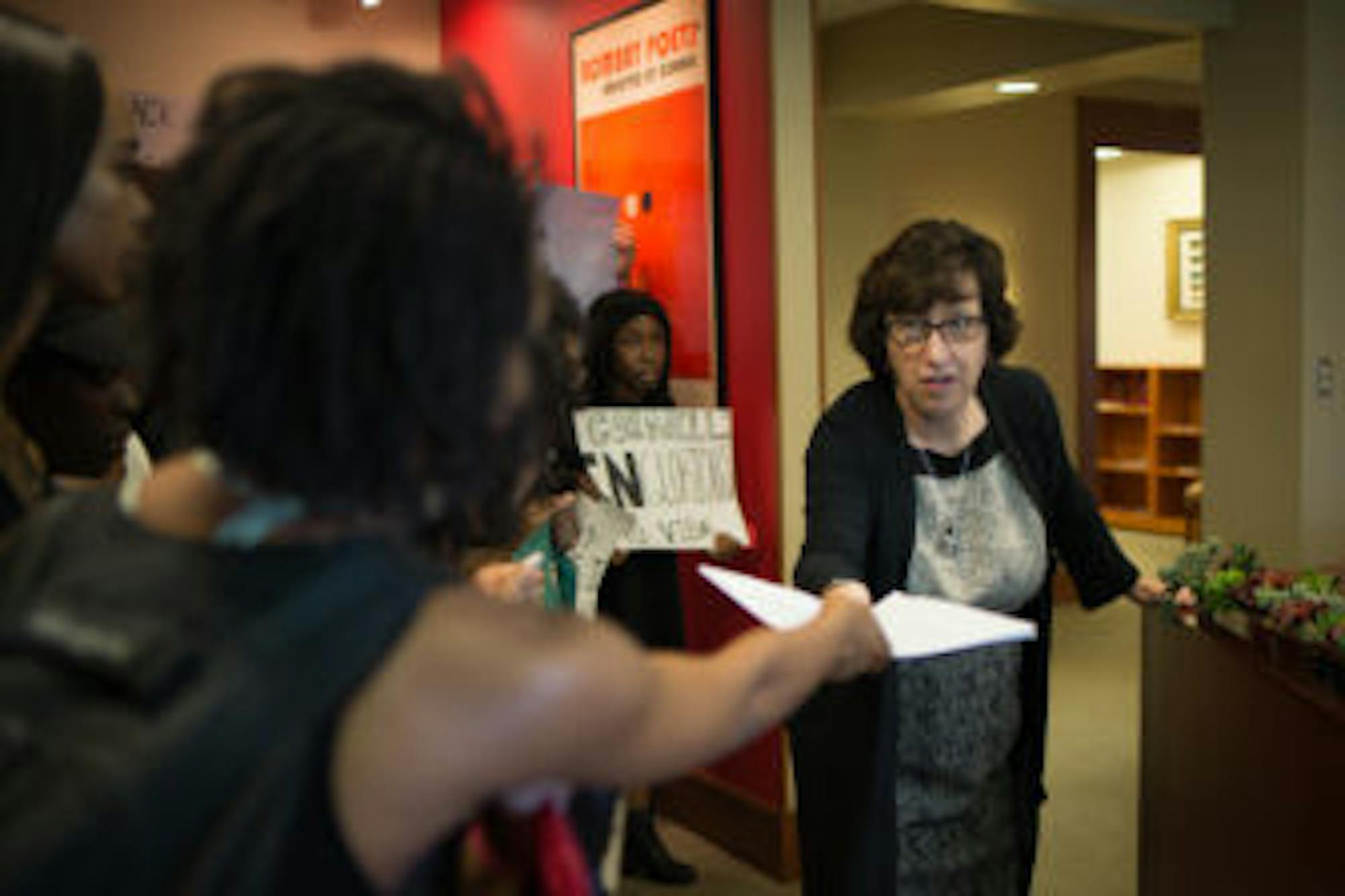
Ithaca Police arrested John Greenwood ’20, a 19-year-old white student, within hours of the altercation and have charged him with two misdemeanors: third-degree assault and second-degree aggravated harassment. Police are continuing to investigate whether there is enough evidence to charge Greenwood under hate crime statutes, Ithaca Mayor Svante Myrick ’09 said.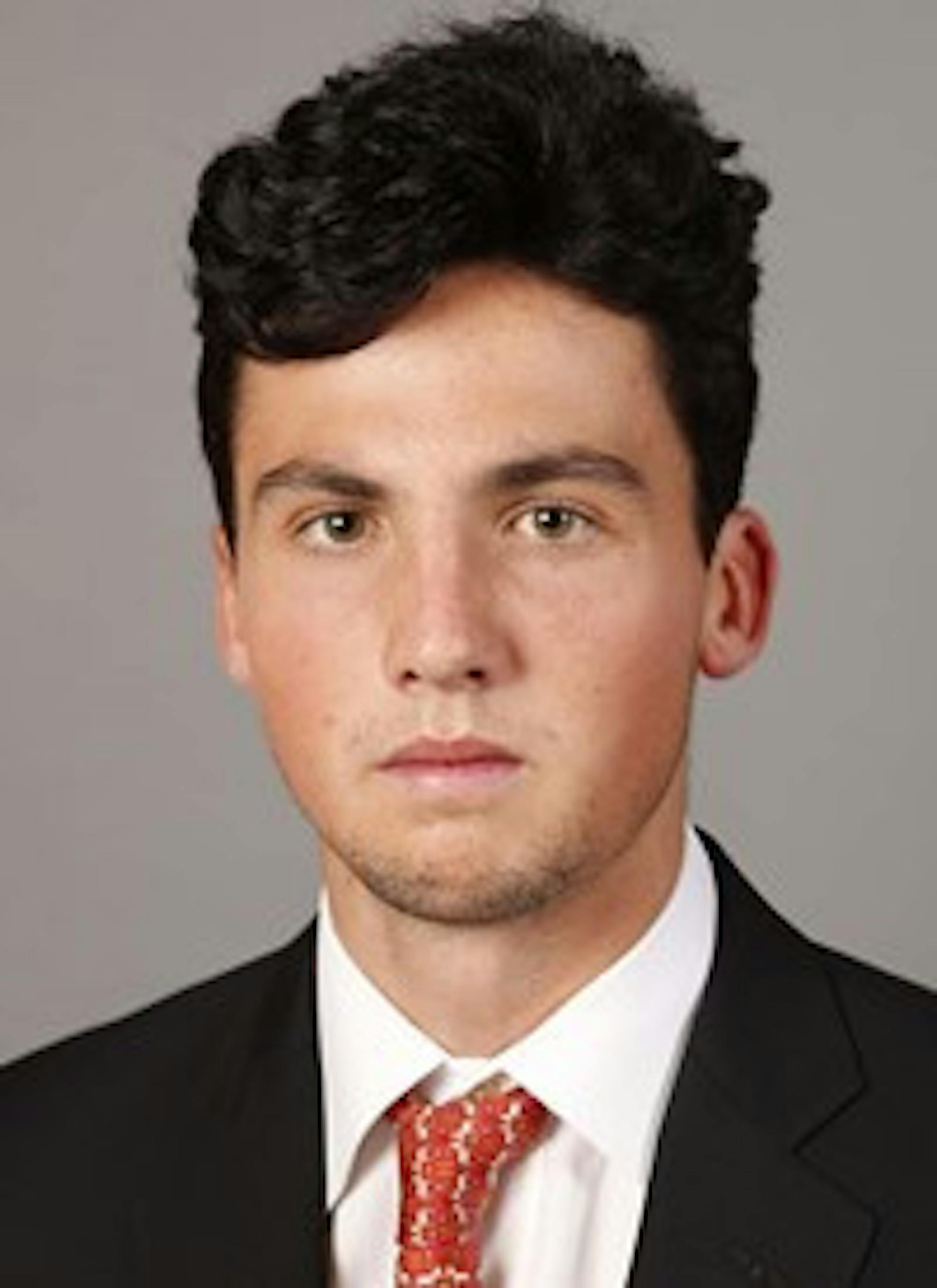
The injured student, a junior and a member of Kappa Sigma, spoke to The Sun on the condition of anonymity on Friday from a local hospital, where he was checked for a concussion and a broken nose, of which he had neither. “I was pretty bloodied up,” he said. Two people with the victim after the assault said in sworn statements to police that the student’s shirt was soaked in blood following the incident.
Greenwood apologized in an email on Wednesday for using “unacceptable and inappropriate language,” but did not address the reported physical dispute. Greenwood’s attorney, Ray Schlather J.D. ’76, said his client was not involved in any fight and had not committed any crime.
Black Students United’s executive board demanded on Wednesday that the University work to increase the presence of black students on campus, create an anti-racism institute, hire additional non-white mental health and medical personnel and require diversity training for employees and specific coursework for students. The demands are meant to be fulfilled over several years, although BSU members want work to begin immediately.
Led by co-chairs Delmar Fears ’19 and Traciann Celestin ’19, BSU also demanded that any students found to have been involved in the assault be expelled, that the Psi Upsilon fraternity be permanently banned from campus and that the fraternity’s house be converted into a cultural center for members of the African diaspora.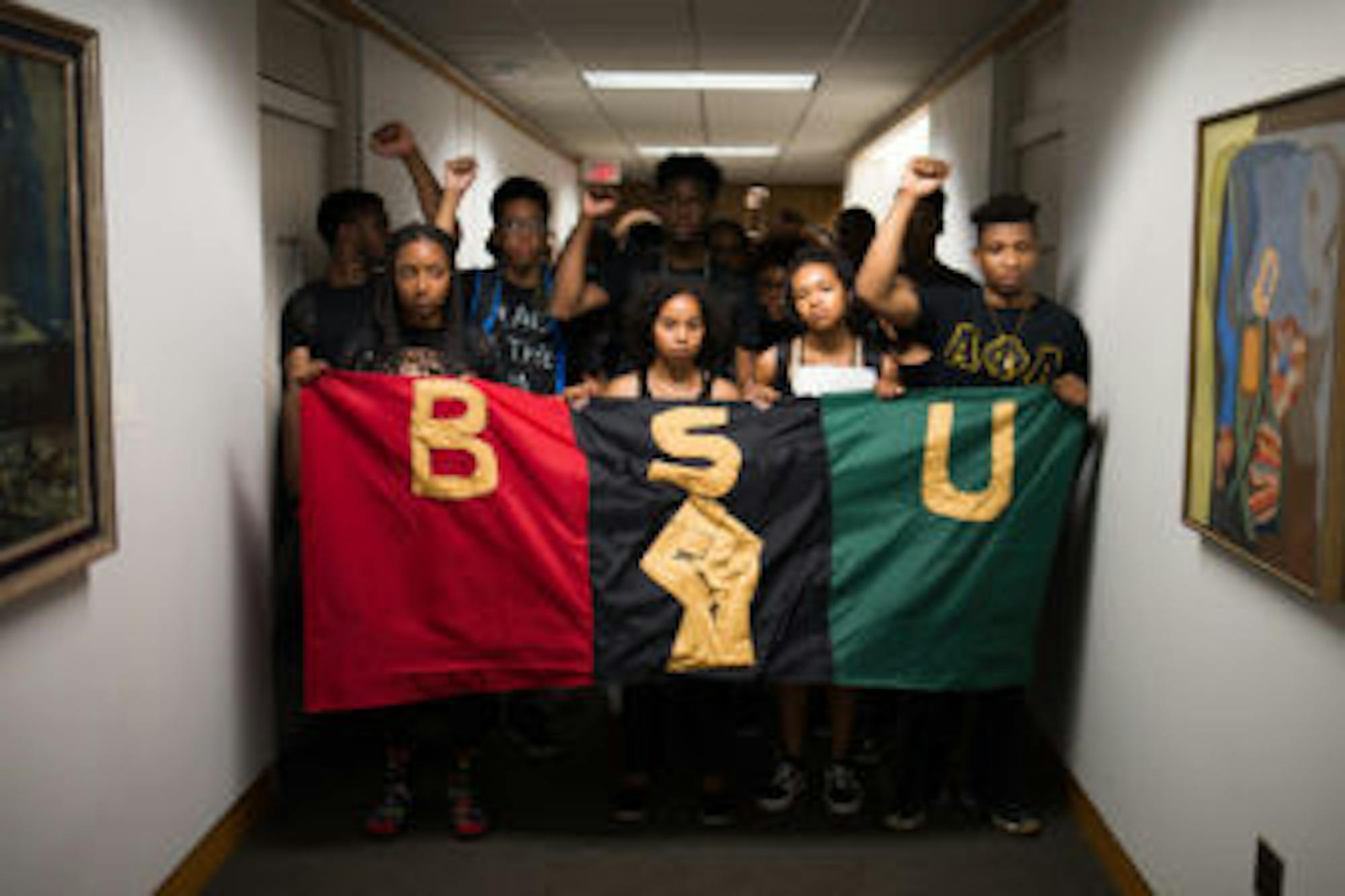
Thomas J. Fox, executive director of the Psi Upsilon International Office, said in a statement that “no initiated members” of the fraternity, which had its recognition revoked in 2016, were involved in the assault. But Psi Upsilon’s alumni Board of Governors told Cornell this week that it was closing the Cornell chapter of the fraternity indefinitely.
Fox said the international office of the fraternity had found that some members of the suspended Cornell fraternity were recruiting while the chapter was suspended. The organization announced that it has extended the suspension of the Cornell chapter until the fall of 2020.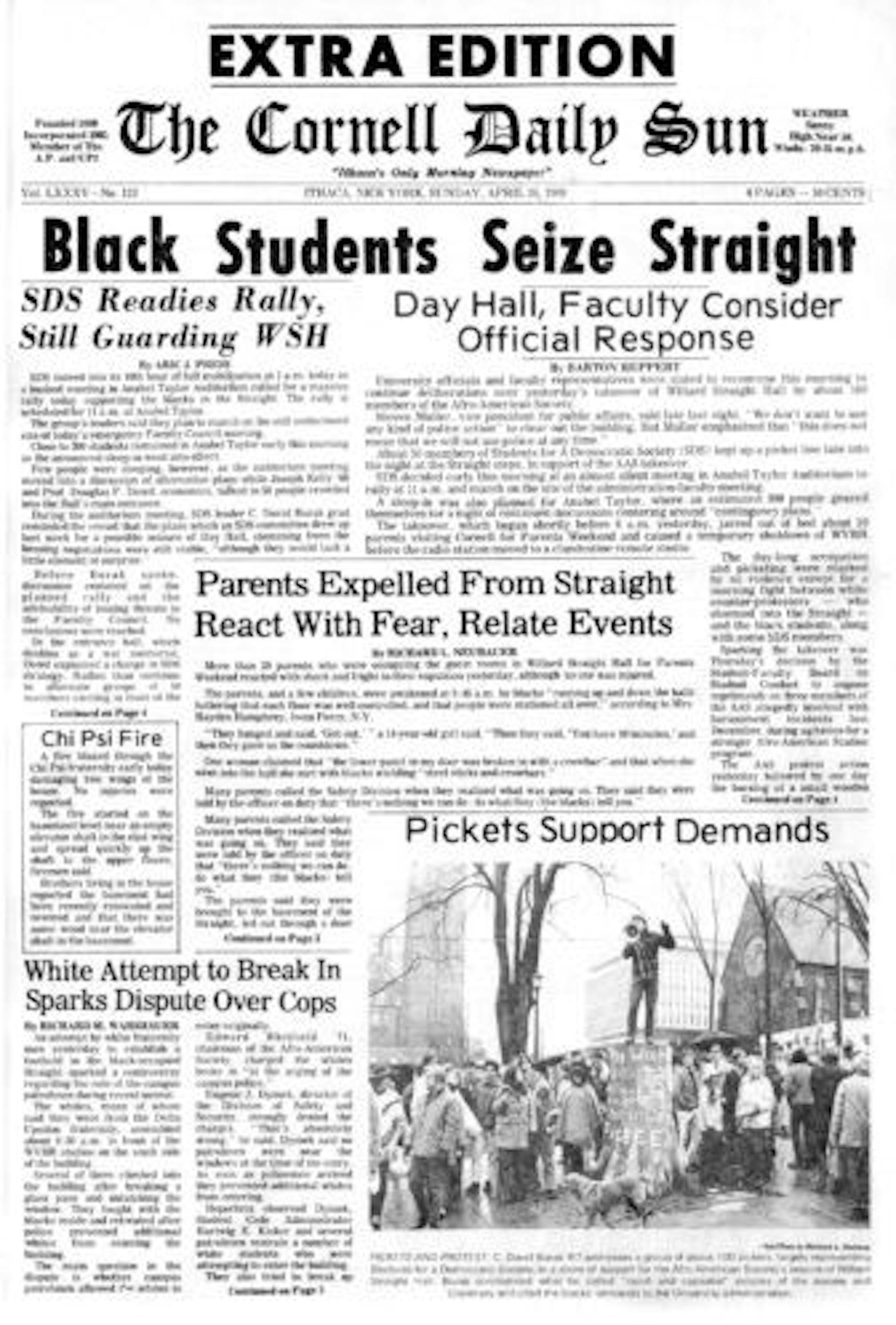
As students squeezed into Willard Straight Hall and sat on the floor as music blared and BSU members passed out bottled water, the organization’s co-chairs reflected on the parallels between Wednesday’s occupation and the armed takeover in 1969.
“There is an act of racial violence happening on campus again,” said Fears, whose mother graduated from Cornell in 1973. “This isn’t new.”
Celestin said BSU had chosen to occupy the building for the same reasons black students had seized the building in April of 1969. “This is the heart of campus,” she said, “so we want to disrupt the heart of campus.”
David S. Mason ’69, now a professor at Butler, was stationed outside of Willard Straight Hall during the 1969 takeover photographing the scene for the University yearbook, the Cornellian. Informed of Wednesday’s occupation by a Sun reporter, Mason said his first reaction was “amazement.”
“Almost 50 years after that incident, we’re still plagued with the same problems: This issue of racism, more generally, but also specific cases of racist actions on campus,” he said in an interview.
But there were also stark differences between the two occupations. Black students, in 1969, expelled at least 20 parents from guest rooms in the building at 5:45 a.m. during Parents Weekend, The Sun reported. Members of The Afro-American Society, in 1969, remained in the building for more than 24 hours and armed themselves after an attempted intrusion by white counter-protesters. The takeover led to a host of changes and at least one resignation at the University, The Sun reported in 1969.
Wednesday’s protest, on the other hand, was condoned by the University, with at least a dozen staff members present — including a vice president and the dean of students — and BSU members were in contact with Cornell Police and administrators throughout the day, they said. The sit-in ended as scheduled, at 4 p.m.
Students were cautiously hopeful that the drastic measures black students deemed necessary nearly 50 years ago would not be required to make substantial change today. Pollack, who began her tenure as president in April, seemed very receptive to BSU’s demands, said Fears, who along with Celestin, met with Pollack and Ryan Lombardi, the vice president for student and campus life, on Wednesday morning.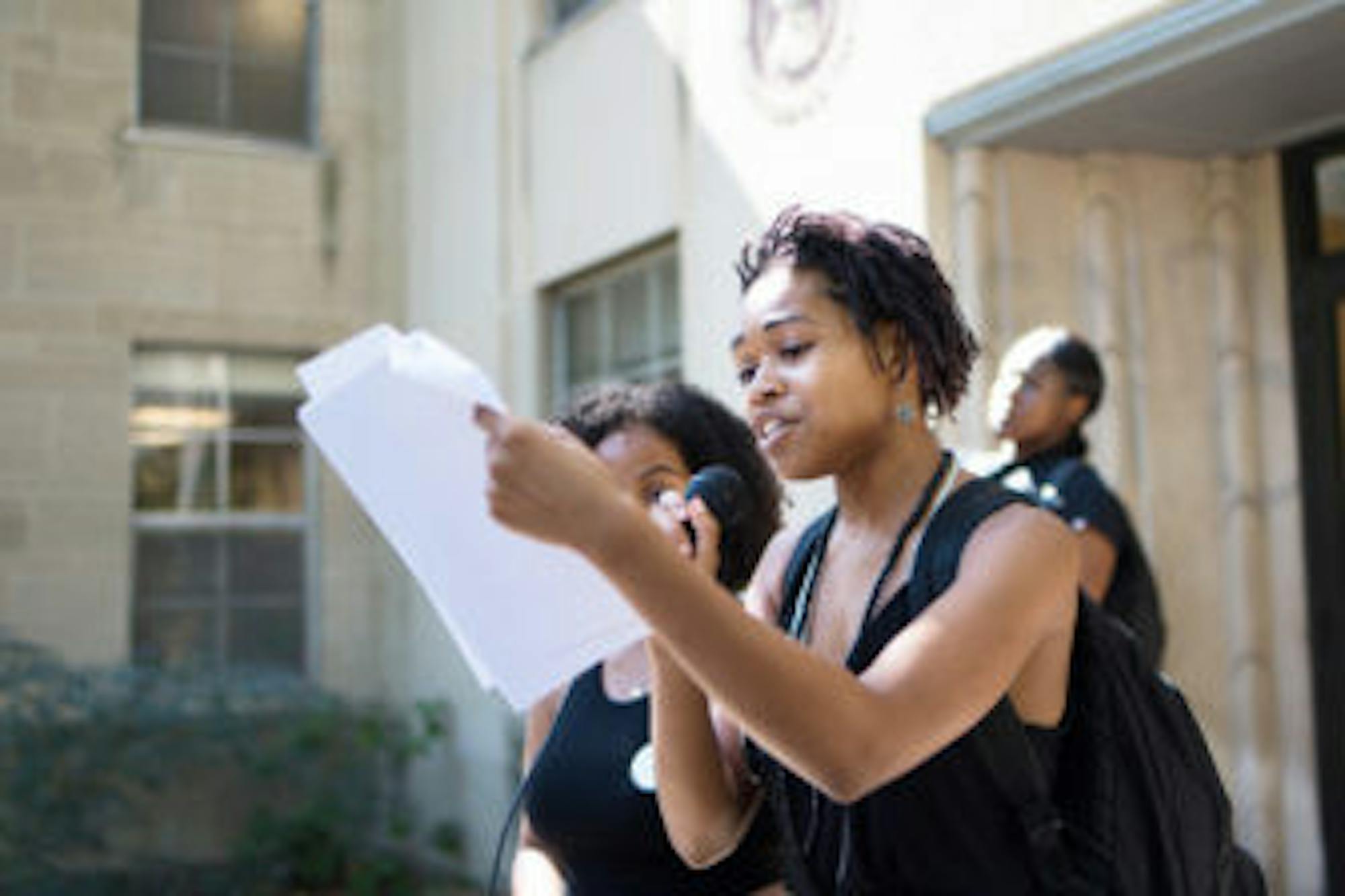
When the group handed Pollack its 12 demands, she said she would work with BSU to “do everything we can to rid this campus of racism.”
“I can’t promise there will never be another racist incident,” she said. “This is a scourge across the country, but I’m going to work with all of you to do everything we can.”
Imani Luckey ’19, a BSU political action chair, looked over the hundreds of students occupying the hall on Wednesday, almost all clad in black in support of BSU, and she let out a sigh, picked up by the microphone.
“This is one of the most beautiful things I’ve ever seen since my start at Cornell,” she said.
Alisha Gupta ’20 contributed reporting to this article.

Black Cornell Students Occupy Willard Straight Hall After Delivering Demands to President Pollack
Reading time: about 6 minutes
Delmar Fears '19, co-chair of Black Students United, hands a list of demands to Cornell President Martha Pollack in Day Hall on Wednesday, Sept. 20, 2017.
John Greenwood '20 was arrested for two misdemeanors following an altercation in Collegetown.
Black Students United, led by co-chairs Traciann Celestin '19 and Delmar Fears '19, center, march through Day Hall prior to delivering a list of demands to Cornell President Martha Pollack and occupying Willard Straight Hall on Wednesday, Sept. 20, 2017.
The Cornell Daily Sun's front page on April 20, 1969, after black students had taken over Willard Straight Hall during Parents Weekend.
Delmar Fears '19, front, and Traciann Celestin '19, co-chairs of Black Students United, read from a list of 12 demands to Cornell before delivering the list to President Martha E. Pollack in Day Hall
Read More










